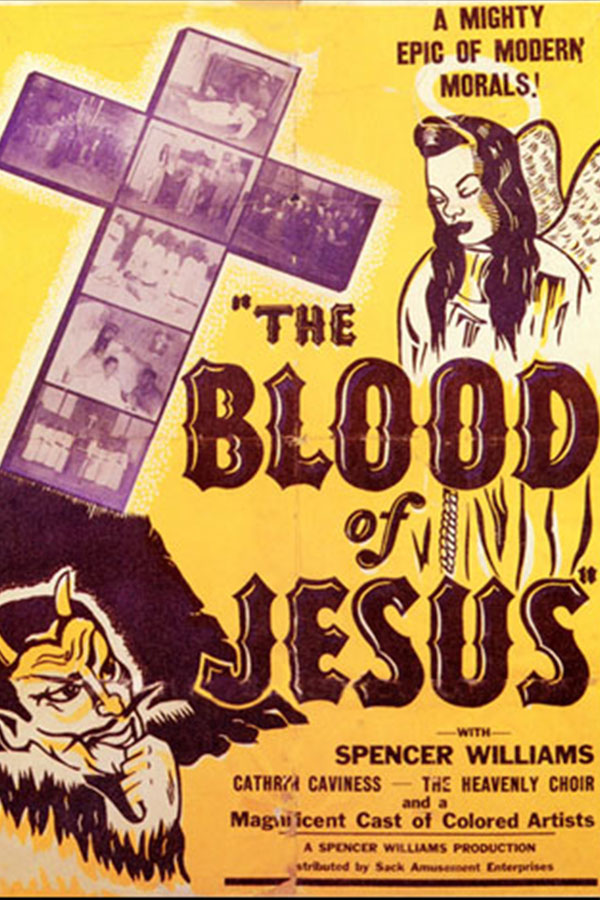Texas Focus: The Blood of Jesus
Texas Spirit Theater
February 11, 2016 7:00pm - 9:00pm
Join us for a special screening and discussion of The Blood of Jesus as part of the Bullock's Texas Focus film series.
Filmed in Texas in 1941 and added to the U.S. National Film Registry, The Blood of Jesus is a morality play about an angel and a devil fighting for a woman's soul set to a score of American gospel music.
Event Details
Join the Bullock Museum for a screening and conversation about the groundbreaking film, The Blood of Jesus, as part of the Bullock's Texas Focus film series.
- Film screening from 7:00 p.m. to 8:00 p.m.
- Q & A to follow the screening with special guest Winston Williams, Executive Director of the Capitol City Black Film Festival.
Rating: Not Rated
Suggested age: 18+
Runtime: 57 mins
Principal Actors: Cathryn Caviness, Spencer Williams, Juanita Riley
Director and Writer: Spencer Williams
Genre: Drama, Fantasy
Release year: 1941
Filmed in Texas in 1941 with a budget of only $5,000, The Blood of Jesus marked Spencer Williams' second directorial effort. In 1991, it became the first race film to be added to the U.S. National Film Registry. A "race film" is generally defined as a film produced by and for African Americans for viewing in segregated movie theaters in the U.S. between about 1915 to 1950.
Considered lost for years, The Blood of Jesus was discovered in a Tyler, Texas warehouse in the mid-1980s. Williams, who both wrote and directed The Blood of Jesus, also starred in the film as Ras Jackson, a rogue who accidentally shoots his wife, Sister Martha, played by Cathryn Caviness. A devout woman nearing death, Martha is pulled between forces that represent both heaven and hell. The film is scored to gospel music sung by members of Reverend R. L. Robinson's Heavenly Choir.
According to film critic David Sterritt, the black and white film has “… nothing remotely slick or sophisticated about [it], which (like all the Williams films I’ve seen) has rough-hewn performances, editing, and camera work. Such technical drawbacks seem unimportant, though, in light of the moral passion and visual creativity that mark the picture. While its cinematic qualities are unpolished, they allow for a directness of expression and a purity of atmosphere that have few equivalents in Hollywood or anywhere else. Just as important, the performances bypass Hollywood-style realism in favor of a ritual quality that recalls the traditions of Southern black churches–just as some of the most powerful and complex American jazz has deep roots in the heritage of gospel and church-choir music.”
Spencer Williams, Jr. (1893-1969), African American pioneer of film and television, began his career in 1929 by writing and acting. Born in Louisiana, Williams moved at a young age to New York City, becoming a call boy for theatrical impresario Oscar Hammerstein. He later received comedic mentoring under vaudeville star, Bert Williams.
After serving in WWI as an intelligence officer, Williams arrived in Hollywood, California in 1923, where he began to act in films. Within eight years, Williams and a partner self-financed a newsreel company called the Lincoln Talking Pictures Company. Throughout the 1930s, Williams worked as an actor as well as a writer and director for films specifically created to play in segregated theaters. He is credited for writing the black western, Harlem Rides Again, and the race horror comedy Son of Ingagi. In the 1940s, Al Sack of Dallas-based Sack Amusement Enterprises financed Williams to write, direct, and act in ten films.
Even after the success of The Blood of Jesus, Williams struggled to produce films that matched its commercial success. Williams eventually co-starred in the controversial yet popular 1950s sitcom Amos 'n Andy, the first U.S. television program with an all-black cast. Spencer Williams's legacy remains a testament to the movement for African American artists in the film and comedy industry.
The Texas Spirit Theater located on the Bullock Museum's second floor is one of the most beautiful film experiences in Austin and features multi-sensory special effects such as lightning, rain, and other surprises.
Museum Members enjoy free unlimited IMAX® documentary films, discounts on feature film tickets, free exhibition admission, discounts in the Museum Store, and more. Learn More.
Learn about ticket prices, refund policies, and parking (free after 5 pm). For evening programs, please enter through the Bullock Museum IMAX Theatre.
